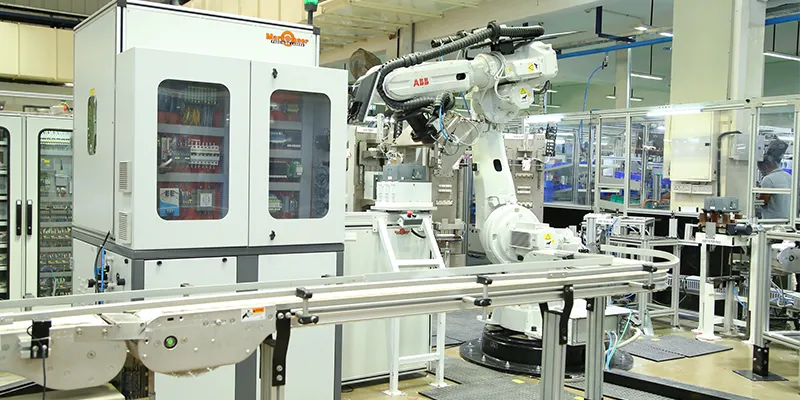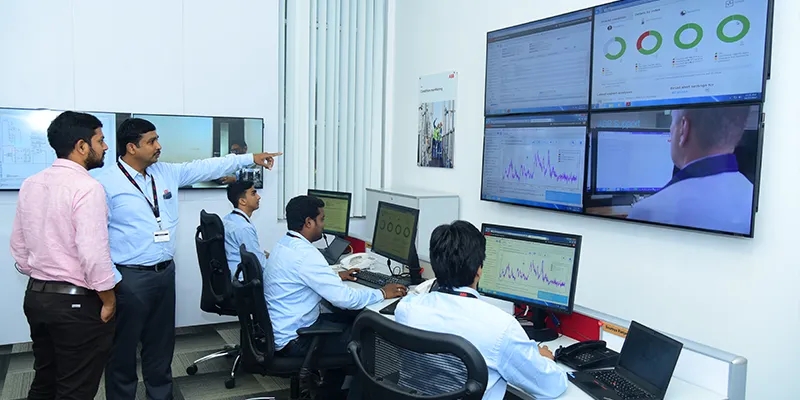Ever since Swiss-Swedish industrial giant Asea Brown Boveri (ABB) first set up shop in India in 1949, it has successfully navigated through different industrial revolutions. Now, in the 70th year of its operations in the country, it is working its way through another industrial revolution: Industry 4.0.
Simply put, Industry 4.0 is about leveraging data for higher automation, aided by computing power. And here, technologies such as artificial intelligence (AI), machine learning, internet of things, big data, and analytics etc. play an important role.
“There is a need to demystify digitalisation from an industrial perspective, and the need to talk about the deeper side of applications,” says Sanjeev Sharma, Managing Director, ABB India. ABB, he adds, has been keenly following the trends in technology, and strongly believes that AI, 5G, additive manufacturing or 3D, and quantum computing will be the defining forces for Industry 4.0. “Industry 4.0 is nothing but things, services, and people connected over the internet,” he says.

Digital platform
The 130-year old company has set up a digital platform, ABB Ability, which brings all elements of automation, and computing together. The focus of the company is now on four verticals: electrification, industrial automation, motion and robotics, and discrete automation.
With deep engagement in sectors such as energy, transportation, logistics, manufacturing, food processing, and infrastructure, to name a few, ABB Ability is looking to help transition them to a new era.
Sanjeev believes there is a productivity gap between Indian industry and that in developed economies, primarily due to the high costs of power and capital. Added to this, the manpower capital is not well trained in India. “If one uses available resources judiciously, one can leapfrog and this is the opportunity for ABB, where we want to take our customers through this journey,” he says.
The Indian industry, though, has the hunger and aspiration to match the best in class at the global level, he says. ABB sees increased digitalisation enhancing productivity, lowering costs, and increasing companies’ ability to meet the requirements of customers.

As an example, Sanjeev spoke of a simple mechanical motor that is used in various applications. The motor, he says, takes a different meaning when a software programmed device is placed on it. Now, one does not need to physically monitor the performance the motor, and it also provides advance warning in case of any malfunction. This can be done due to the continuous data it transmits about the performance, making the entire operation autonomous. “Today, we are making the equipment talk to you rather than diagnosing it,” Sanjeev says.
Automation to the fore
An example of enhanced automation, Sanjeev said, could be where the technology team of ABB sitting in Bengaluru remotely monitors the 125 plants of a cement manufacturer based in Europe. The team does not need to manage the day-to-day operations, but only intervenes in case of any changes to be made in terms of the grade of the cement to be manufactured.
This advancement in technology is also in practice at a leading cement manufacturer in India, where ABB is helping in the digitalising the operations. “These things are possible, and we only ask them where they want to start,” Sanjeev says.
According to ABB, several industries in India are open to adopting current trends, which include increased price transparency, customised production, and increased regulation. Added to this, critical industries are expanding at a fast clip, and it only makes economic sense to go digital.
“Now one can digitalise and extract more ‘juice’ from the same plant. It also helps companies in attracting younger talent,” says Sanjeev on the push by Indian industries to rapidly go digital. Already, with increased digitalisation, various industries are witnessing improvement in parameters like employee and asset productivity, quality improvement, and planning efficiency.
Continuous solutions
The ABB Ability platform currently has 210 digital solutions that are ready to be deployed on an industry open standard. “We are focused on how we can build digital solutions for our customers, and the trust level with ABB is high because we know them well,” Sanjeev says.

The ABB Ability platform is in the phase of standardisation and replication of various assets now and the next phase will be to create completely autonomous operations. “When enough data is created, it will be a good way to create the AI and machine learning applications,” Sanjeev says.
ABB today uses manufacturing assets such as robots, motors, sensors, and automated guided vehicles to enable automation, and further Industry 4.0.
The success of ABB can be gauged from a recent workshop in Germany, which showcased some cases where the digital platform had been deployed. Of the nine cases presented, seven were from India. “Most of the CEOs at these industries are extremely smart and as technology is a big enabler, the drive and motivation is higher,” Sanjeev says.
[“source=yourstory”]



